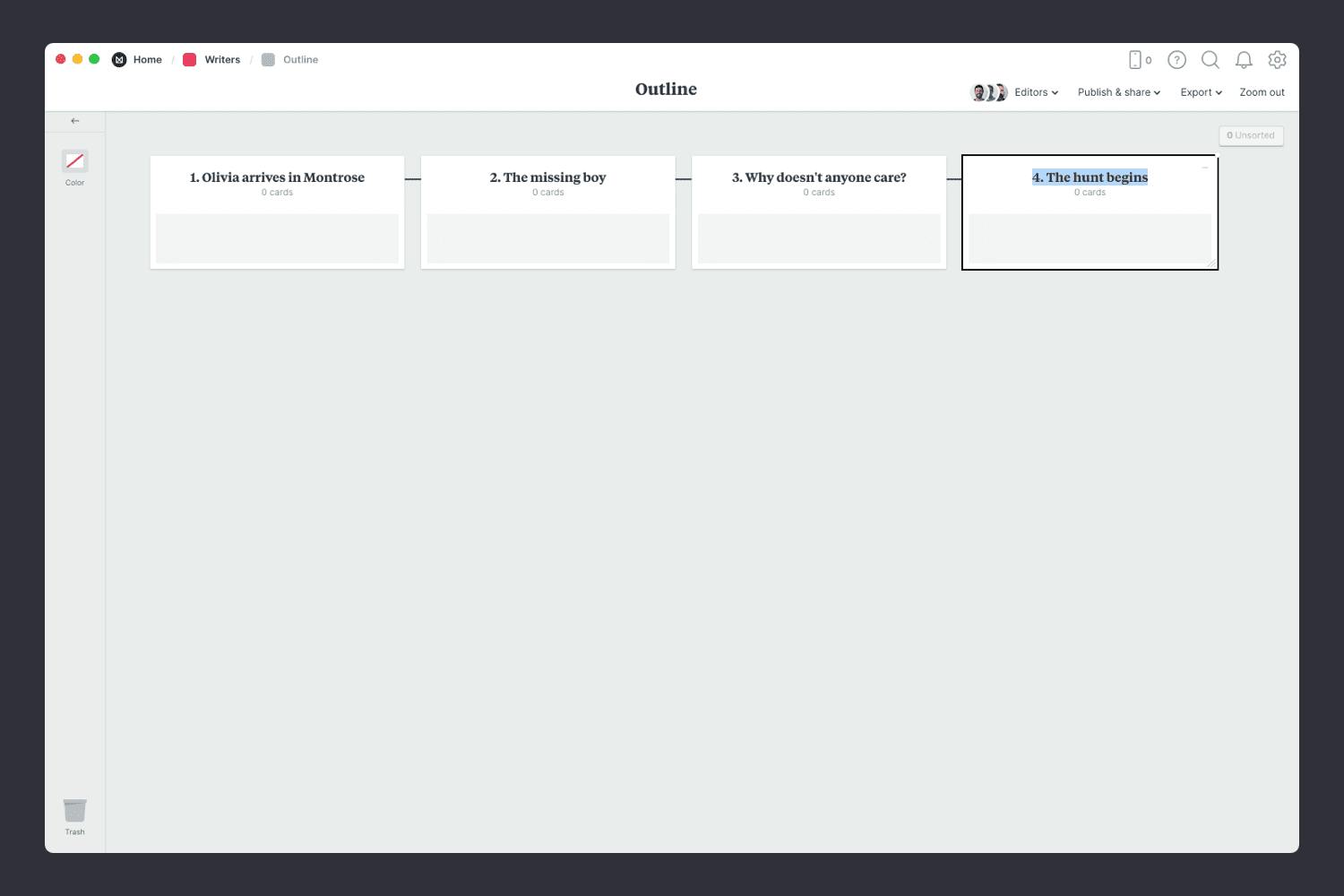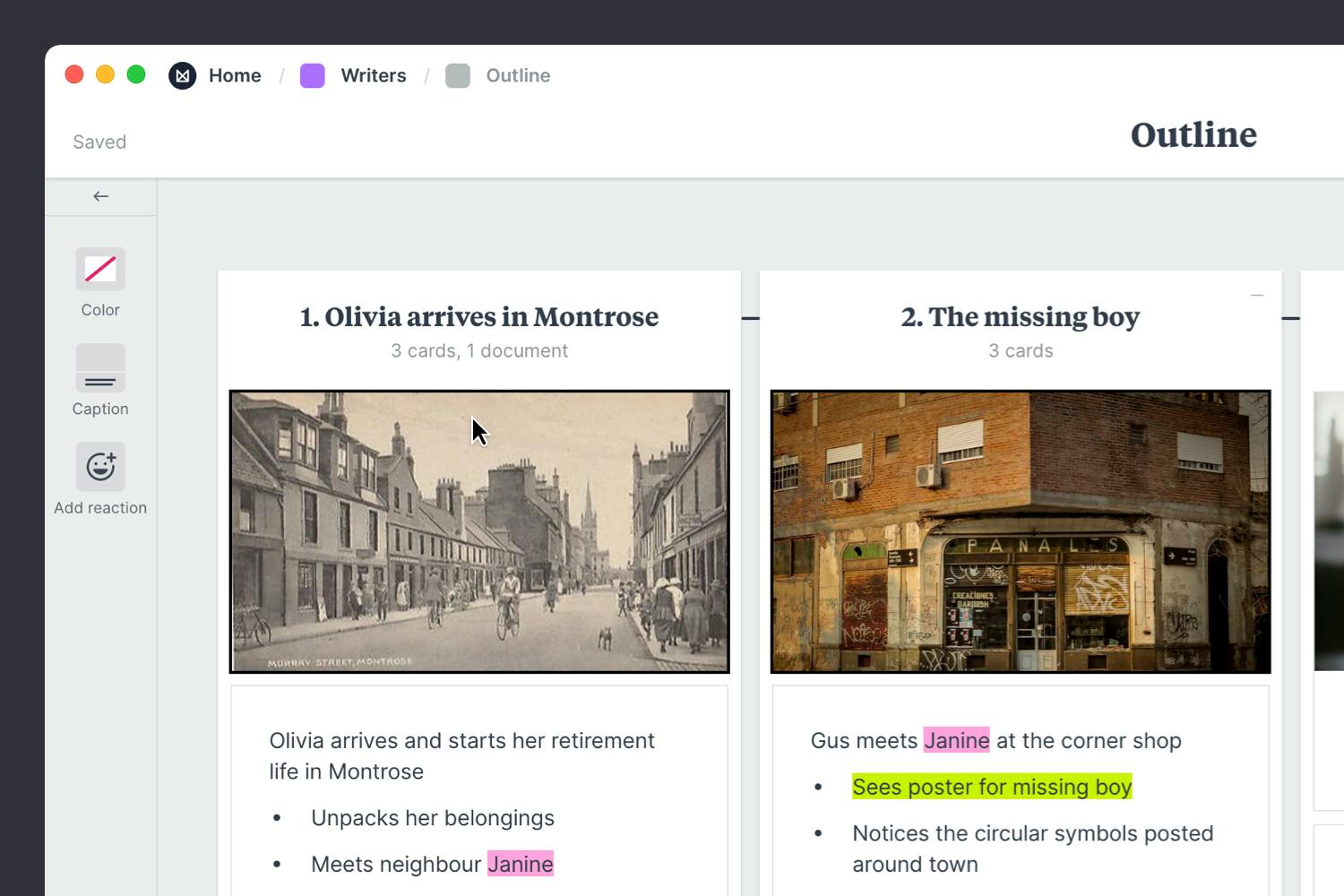Start outlining your next masterpiece
Get started for free with one of Milanote's beautiful outline templates.
Start your outlineSign up for free with no time limit
A novel outline is often described as a roadmap or blueprint for your story. It helps you see the big picture and plan the sequence of scenes, characters and ideas that will become your novel. It's a simple, flexible technique to help all types of writers stay organized.
There are many ways to outline your story, from the Three Act Structure to the Hero's Journey but this method is perfect for 'visual' writers—those who prefer to see the big picture as a sequence of events. Think of it as the modern, digital equivalent to the corkboard or wall of sticky notes, but much easier to manage. If you're keen to start outlining right away, grab the free Story Outline Template!
In this guide, you'll learn the modern approach to outlining a novel using Milanote. Remember, the creative process is non-linear, so you may find yourself moving back and forth between the steps as you go.
Start by laying out the major scenes or events you know so far. These might be the key turning points, locations, or plot twists. Don't worry too much about the order or details yet, just get the main parts out of your head. This is a quick flexible way to brainstorm the centerpieces of your story.

Create a new board for your outline.
Drag a board out from the toolbar. Give it a name, then double click to open it.
Add a Column for each key scene.
Name it, then drag any relevant notes or images into your column
Next, add a sentence or a short paragraph for each scene. There are no rules for how much detail to add, do what works best for you. Think about what's being communicated in this scene, the location, and the characters involved. This will help you consider where characters are introduced and how this scene connects with the next one.

Add a note to describe the plot points.
Start typing then use the formatting tools in the left-hand toolbar.
Seeing your story at this level lets you make connections between themes and concepts you might otherwise miss if you went straight into writing. Re-read your outline so far. Look for scenes that feel out of place. Perhaps your transitions need some tweaking or a character appears without a proper introduction. Highlight areas that need more work and move scenes or plot points around to get the sequence just right.

Drag plot points around to get the sequence right.
While imagery probably won't make an appearance in your novel, this is a great technique for kickstarting new ideas. Experiment by adding images or movie clips that relate to your scenes. If you're the type of writer who creates moodboards, now's the time to see if you've already got imagery that could help evoke the feeling you're trying to capture. Try saving images from Google Images, Pinterest, or Milanote's built-in image library.

Use the built-in image library.
Search over 3 million beautiful photos powered by Pexels then drag images straight onto your board.
Embed Youtube videos or audio in a board.
Copy the share link from Youtube, Vimeo, Soundcloud or many other services. Drag a link card onto your board, paste your link and press enter.
With any creative technique or project, it’s important to be open to constructive criticism. Now that the first version of your outline is done it's time to ask for specific feedback on the sequence, plot points, and character development. Make sure you stay open to suggestions and improvements and try not to take criticism personally.
If you’re not sure how to deal with the feedback you get, writer Neil Gaiman has some insight: “Remember: when people tell you something’s wrong or doesn’t work for them, they are almost always right. When they tell you exactly what they think is wrong and how to fix it, they are almost always wrong.”

Invite a writing partner or editor to provide feedback.
Open the "Editors" menu from the title bar of your board. Add email addresses of the people you'd like to collaborate with—they'll receive an invitation via email.
Start a comment thread.
Drag out a comment from the toolbar on the left and place it on your board. Other editors can reply to your comment.
Mention others to get their attention.
Type '@' in any text field to mention someone who has access to your board. They'll receive a notification and be able to respond to your comment.
Now you have a solid outline for your story and you've gathered constructive feedback, you can start sketching out the details in a draft. Your outline and your drafts are perfect companions. Jump between them as your need, switching ensures your story works at the high level and in the details.

Drag a Document card onto your board and start typing
Now that you've finished a draft outline, you can start writing, confident that your story has a strong foundation. If you're starting a new novel right now, use the free outline template below to start mapping it out or read our full guide on how to plan a novel.
